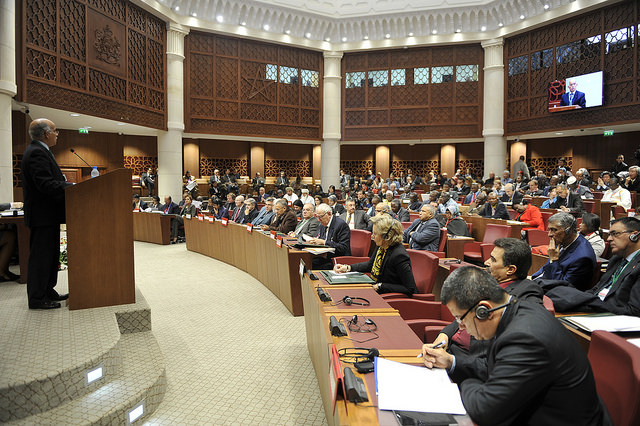
Parliamentarians from around the world gather in the Parliament of Rabat, Morocco, for the 8th Session of the Consultative Assembly of Parliamentarians for the ICC and the Rule of Law (CAP ICC). This is the largest gathering of Legislators devoted to the fight against impunity for mass atrocities. This year’s CAP ICC marks its first session held in an Arab country and features the participation of members from over 120 democratically elected Parliaments from all regions of the world, State Officials, representatives of civil society and other relevant stakeholders, including the International Criminal Court (ICC).
Addresses by Mr. Rachid Talbi El Alami, Speaker of the Chamber of Representatives of Morocco, Hon. Dr. Mohamed Cheikh Biadillah, Speaker of the Chamber of Councillors, Dip. Minou Tavarez Mirabal (Dominican Rep.), Acting President of Parliamentarians for Global Action (PGA), H.E Judge Sang Hyun Song, President of the International Criminal Court, among other prominent Speakers, have inaugurated this two-day event.
The debate on the role of members of Parliament in bringing political support for the international criminal justice system is central to this Assembly. Additionally, participants have a unique opportunity to participate in a session with the Office of the Prosecution of the ICC regarding the investigation and prosecution of war crimes, crimes against humanity and genocide and discuss about preliminary examinations being conducted inter alia in Ukraine and Nigeria. Most importantly, the Assembly focusses on efforts to promote the universality of the Rome Statute; discusses the challenges and brings about ideas on how to remove the serious obstacles to ratification in 72 United Nations Member States that have not joined yet the new system of international justice based on the Rome Statute, which counts on 122 States Parties.
The 2014 CAP ICC will coincide with the 36th Annual Parliamentary Forum of PGA, occasion during which the Defender of Democracy Award is presented to individuals who, through their own commitment and active engagement, have strengthened democracy and democratic practices world-wide.
Hon. Justice Navi Pillay, former UN High Commissioner for Human Rights; former President of the International Criminal Tribunal for Rwanda; former ICC Judge; and Mr. Abdelaziz Bennani, former Vice President of the International Federation of Human Rights, co-founder and President of the Euro-Mediterranean Human Rights Network and member of the Equity and Reconciliation Commission are the awardees selected by the PGA Board for 2014.
After the deliberations taking place during the seven working sessions of the CAP-ICC, Participants will discuss and agree upon a comprehensive plan of action (Rabat Plan of Action 2014), which will contain specific strategies to advance the fight against impunity for gross human rights violations and grave breaches of international humanitarian law in all regions of the world.
On the occasion of this unique event, leading PGA Members made the following statements:
Me. Mohammed Benabdessadeq, MP (Morocco), Chair, PGA Morocco Group: “By exercising our political and legislative functions, as Parliamentarians, we have the power and responsibility to advance the Rule of Law worldwide. The 2014 CAP-ICC hosted by the Parliament of Morocco is a wonderful opportunity for us discuss and share our different experiences in matters like the adoption of implementing legislation, our understanding of the functioning of the ICC system and engage in peer-to-peer dialogue on different steps that we can take to support the fight against impunity for the most serious crimes.”
Dip. Felipe Michelini (Uruguay), Convenor, PGA International Law & Human Rights Program: “A gathering of this size allows for parliamentarians around the world to better understand what we can do in our individual capacities in order to support the court’s mandate in investigating and prosecuting those allegedly responsible for the commission of the most serious crimes of international concern. While the Office of the Prosecutor is conducting investigations and preliminary examinations in many countries; the role of parliamentarians at both the domestic and international level is crucial in ensuring the universality and effectiveness of the Court, by enacting the relevant domestic legislation in order to investigate and prosecute international crimes in national jurisdictions and fostering cooperation with the court. By doing so, parliamentarians can help closing the impunity gap.”
Hon. Stephen Tashobya (Uganda), Deputy Convenor, PGA International Law & Human Rights Program: “The ICC has placed at the heart of its concerns all African victims, recognizing that they have, not only a right to reparations, but also a right to truth, justice and the non-repetition of these serious crimes. For these reasons, it is important that as parliamentarians and members of the international community we stand by the court and support the integrity of the system of The Rome Statute.”
Ms. Barbara Lochbiher, MEP (Germany): “Parliamentarians gathered in Rabat have the chance to discuss ways on how states must be equipped with the appropriate legislative tools and law enforcement systems to give effect to the orders of the Court (e.g. arrest warrants requests). State cooperation and the international support of the United Nations Security Council, the African Union and the European Union, while respecting the independence of the judiciary, is paramount for the Court to be able to effectively exercise its mandate and to ensure the integrity of the proceedings. This goes hand in hand with the quest for justice by the victims who deserve to know the truth.”
Dip. Minou Tavarez Mirabal (Dominican Republic), President and Chair of the International Council, PGA: “It is a great honor to participate of such an event where so many voices are brought together in order to define strategies that can contribute to building a strong, universal and effective international criminal justice system, sending a message that impunity will no longer be tolerated and that the establishment of the Rule of Law, which is necessary for all human beings to live a life free from danger, in peace and where their rights are respected.”

